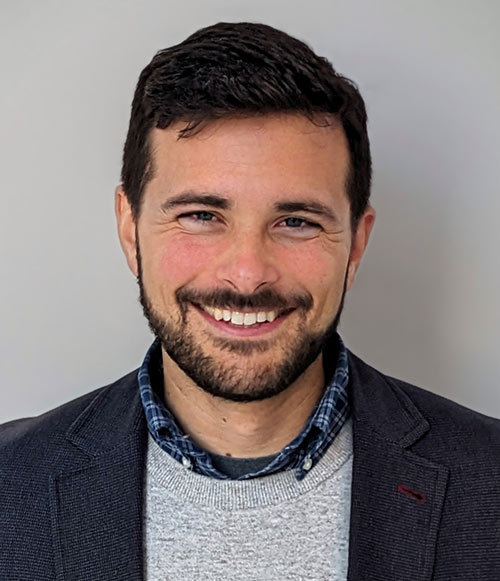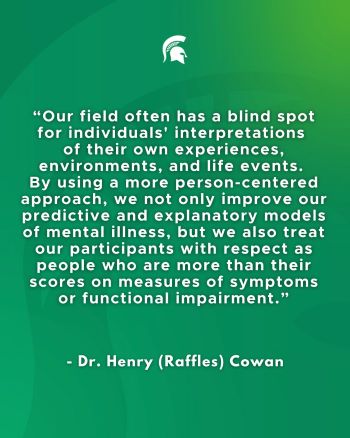Introducing New Clinical Science Faculty Dr. Henry (Raffles) Cowan
October 9, 2024 - Emily Johnson, Shelly DeJong
 The Michigan State University Psychology Department welcomes Dr. Henry (Raffles) Cowan as a new assistant professor in the Clinical Science program.
The Michigan State University Psychology Department welcomes Dr. Henry (Raffles) Cowan as a new assistant professor in the Clinical Science program.
Cowan lived in Southwestern Ontario before moving to the United States in 2015 to attend graduate school. He is a graduate from the Psychology Ph.D. Program at Northwestern University in Evanston, Illinois. He completed a clinical internship and postdoctoral fellowship at Ohio State University, where he was part of the Early Psychosis Intervention Center (EPICENTER) in the Department of Psychiatry and Behavioral Health, one of the largest coordinated specialty care services for early psychosis in the country.
Dr. Cowan’s research lies at the intersection of clinical science and personality psychology. His focus includes a person-centered approach to understanding risk, resilience, and recovery from serious mental illnesses, such as schizophrenia. He also has a special interest in narrative identity, which has led him to study how individuals with psychosis perceive themselves as the protagonists in their life stories.
Dr. Cowan sat down with us to discuss his research interests, what he’s looking forward to about joining the department, and what he hopes his impact will be.
What drew you to study psychosis and narrative identity?
I was fascinated by psychosis from an early stage in my academic journey. One of the things that got me so interested in psychopathology in the first place is how different people’s subjective experiences can be in the world. I really wanted to understand what it is like to have those different experiences. At Northwestern, I was advised by both Vijay Mittal, a clinical scientist studying the development of psychotic disorders, and Dan McAdams, a personality psychologist. I was introduced to narrative identity, which is the idea of how you understand not just who you are today but also how your life story has made you who you are today. I’ve found that narrative identity is a really nice way to look at people’s subjective experiences in a systematic format where you can do quantitative analysis with the type of data that are produced. Since then, I’ve worked to bring together clinical science and personality psychology.
Why is it important to you to take a person-centered approach to understanding mental illness?
Our field often has a blind spot for individuals' interpretations of their own experiences, environments, and life events. I think it’s interesting that many researchers do large, complex studies, receive incredibly detailed information, spend years studying their participants, but never once ask them about their experiences in an open-ended way. By using a more person-centered approach, we not only improve our predictive and explanatory models of mental illness, but we also treat our participants with respect as people who are more than their scores on measures of symptoms or functional impairment.
 Why are you excited about joining the MSU Clinical Science program?
Why are you excited about joining the MSU Clinical Science program?
MSU’s Department of Psychology is renowned for its excellence and strong clinical and personality psychology areas. I’m excited for the opportunity to work with esteemed colleagues and contribute to such a respected program. Additionally, living in East Lansing offers a great environment for raising my two children, enjoying nature, and is much closer to our family in Canada, which checks all my boxes.
What upcoming projects are you excited about?
I am excited about a new project investigating the sense of agency in schizophrenia spectrum disorders. We received an external grant to explore how individuals with schizophrenia perceive their own actions in the world. We are recruiting people with schizophrenia spectrum disorders to do lab-based tasks of agency, and the part I’m most excited about is that we’ll also connect these tasks to clinical and life story interviews.
What do you hope your impact will be as a researcher?
I want to improve both the lives of individuals with mental health conditions and their involvement in the research process. My goal is to demonstrate that it is possible to respect our participants as individuals and at the same time conduct rigorous research. This way, our research will be stronger, both empirically and ethically.
What's a memorable book you would recommend about psychosis?
One of my favorites is The Center Cannot Hold by Elyn Saks, which is a memoir of her experience with schizophrenia. Saks provides deep and interesting insights into the experiences of those living with schizophrenia.

